This article has a two-fold purpose: the first is to explore a recommended tea, and the second is to further examine the effect of different waters on the resultant infusion.
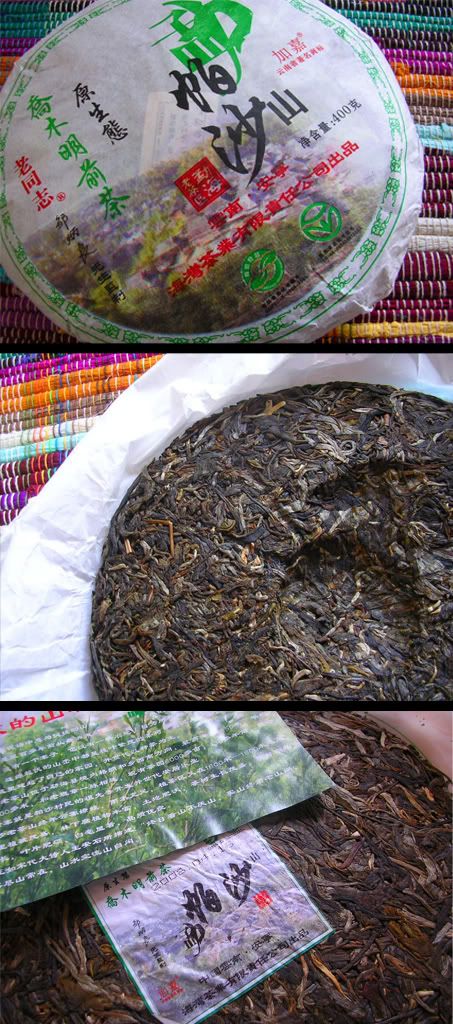 Alternatively known as Pashashan, this mountain is in the south Menghai region. The tea was recommended back in the later Georgian era by Bearsbearsbears, and also by Scott of Yunnan Sourcing from whence comes this bing. I've mentioned before that a recommendation from someone whose opinion I trust can be enough to get me to buy a cake without first trying it (particularly if it's not too expensive), and this is definitely one of those cases. It's been on my list of recommendations for about a year, and so it's good to finally sit down with it. It was around $32, making it not-quite-expensive, but also not-quite-inexpensive.
Alternatively known as Pashashan, this mountain is in the south Menghai region. The tea was recommended back in the later Georgian era by Bearsbearsbears, and also by Scott of Yunnan Sourcing from whence comes this bing. I've mentioned before that a recommendation from someone whose opinion I trust can be enough to get me to buy a cake without first trying it (particularly if it's not too expensive), and this is definitely one of those cases. It's been on my list of recommendations for about a year, and so it's good to finally sit down with it. It was around $32, making it not-quite-expensive, but also not-quite-inexpensive.Mengpashashan itself was, according to the neipiao, settled around 300 years ago when it was covered in wild tea trees. There are now over 1000 acres under cultivation, with a mean elevation of some 1700m (maximum ~1850m). The neipiao also claims that it was migrants from Mengpashanshan who first settled the Banzhang slope on Bulangshan, about 130 years ago.
The ticket claims that the constantly misty, rainy atmosphere of Mengpashashan results in early budding and long harvesting periods, with sizable silver tips - these are evident in the cake itself, so perhaps there is something in it.
The wrapper, neipiao, and neifei are all very modern in printing and materials, and look rather professional - clearly this tea is aimed at the type of folks in the "organic" market, rather than the somewhat more rustic tradition of Pu'er (and I do like rustic very much).
Since moving house a few weeks ago, we've been brewing tea using our Brita-filtered water from the mains supply - Thames Valley water (our regional water-board) is notoriously poor in quality. Today marks the first time that we've ventured out to secure proper water: we're trying out "Scottish Mountain" mineral water from a nearby supermarket. The mineral composition is low in both calcium and carbonates (chalk), which makes a nice change to the water that comes out of the Brita filter. During infusion, we'll switch between the waters to examine the effect.
Scottish Mountain @ 100C in 12cl shengpu pot; ~8-9g leaf; 1 rinse
Dry leaf:
Whole leaves makes this cake look very un-Taiwanese, thankfully. It feels as if it has a "skin" of chunkier leaves around the faces of the cake, with some slightly lower-grade material on the inside. The tips are big 3-4cm affairs, backing up the claim made by the neipiao. Apart from the pleasant appearance, one striking feature of this tea is the aroma, which is highly potent and jumps right out of the chahe.
On adding the leaves to the damp, rinsed pot, the sweet aroma intensifies even further - quite remarkably so. Good aroma can imply good flavour, and so the first impressions are favourable.
The colour is an absurdly bright yellow - it almost appears luminescent. The clarity is likewise extreme, being entirely crisp and clear. The few furs from the tips float around in the bottom like distant fish in a pool of pure spring water.
The beidixiang is fresh and green, of good duration, while the lengxiang is darkly sweet and similarly enduring. The long-lasting nature of the aroma similarly bodes well for its character.
What a fresh and zesty affair this tea is, carrying with it a good, solid, untreated ku. It palpably swells as it progresses to the back of the mouth, resulting in a huigan that makes my jaw muscles ache in a pleasant way. The texture is smooth, from the tips. My mouth remains watering from the huigan over one minute later - good stuff.
Now, with the basic character of the tea ascertained, we switch from the mineral water to the Brita-filtered water. The effect is dramatic: the previously-enduring aroma are short-lived, and unremarkable. They are muted and do not thrill the nose as before. The texture in the mouth remains as smooth as before, but the sensation does not reach up to the nose as it did previously, nor does it stretch out in flavour to fill the mouth as much. Also, there is very little of that swelling crescendo towards the huigan.
Resumption of mineral water in the next infusion returns the tea to its prior pleasant state. The effect is enough to convince me that putting in the little extra effort (and expenditure) to obtain this mineral water is well worth it.
Even out to the tenth infusion, the mouth remains watering, and the soup remains bright, clear, and very yellow.
Wet leaf:
Whole, or very large fragments, containing a variety of leaf sizes. The leaves are of peculiarly healthy nature, reminding me of a good maocha: the stems are rubbery, thick, and flexible, while the faces of the leaves are robust, pliable, and strong without being tough. I cannot say if this is because of their "organic" status, but they're certainly very good to handle.
Overall:
Really rather pleasant. I think this has the bright ku and wide flavour to make it appear quite decent in a few years time.
This tea is a particularly dangerous recommendation for me, because it appeals to my personal preferences very much: it is a yellow, mushroom Pu'er, and quite strong - just the way I really like them. I can see myself grabbing a few more of these to see what happens over the years, but do take that recommendation with a pinch of salt: this is a borderline recommendation based only on my preference, and you may well find yourself not too enamored of it.
Personal experience, as ever, is the best judge. It's one to try if you haven't, though - judgements on price being something that each of us has to do alone, of course. In recent memory, it's not up to the 2007 Xizihao 8582, but it's good enough.
Addendum
March, 2011
I was very happy with this pile of cakes, which I bought at the time of release for some $31. They're now selling for $40 - not much of an increment, considering that they are now half a decade old. In fact, $40 for a decent five-year cake could be a real bargain.
It's time to revisit this old cake to see how it's doing - and whether or not I should be buying more.
Over the years, this cake has turned from its original black to a proper red. The photograph below doesn't appear to show this change very well, but, in natural light, it's a red 'un. This fills me with hope.
My cakes seem to follow seasonal trends, and they get a little quiet and introverted during their winter slumber. The aroma in the tea-room is sweet, but markedly quieter than in summer, when it really strikes the senses.
The leaves are mostly small, and quite fragmented. It is easy to separate a session's worth of leaves from the mothercake.
At this stage, I'm rather nervous - will I still like this cake? Was I able to pick a decent cake back when I bought this? What if it's dreadful?
I let out a much-deserved sigh of relief as the full sweetness of the aroma arises from the first infusion. At the very least, it's not a dead cake. The hot water wakes it from its rest.
It is very sweet, but this swells to a mouth-watering finish. Like the 2009 Xizihao cake from the same area, it is remarkably powerful. There are notes of tobacco and hay, in that savoury manner of the Xizihao, but both are dominated by a huge, clean kuwei. It cools the mouth nicely - this suggests the presence of some decent leaves.
You'll notice from the above image that the soup has darkened in the years since I last photographed it.
The big question that I ask of myself is: should I buy more? It is clean, and powerful, and sweet... but it's not immensely dense in the mouth. It isn't a big, fat, thick tea. Rather, it is a particularly well-blended and clean example of what Haiwan can do. At no stage does it turn rough, which is a pleasant surprise from this more mainstream producer. Note that it's not their usual (fairly bad) "Laotongzhi" [laow-tong-djer, old comrade] brand, which might explain it.
As I mulled it over, I realised less than $40 in Maliandao will get you something awesome from 2005 (e.g., Yisheng), which makes this Haiwan cake seem less appealing. Compared to a lot of cakes, though, it's a goodly amount of Mengpasha potency for a decent price.

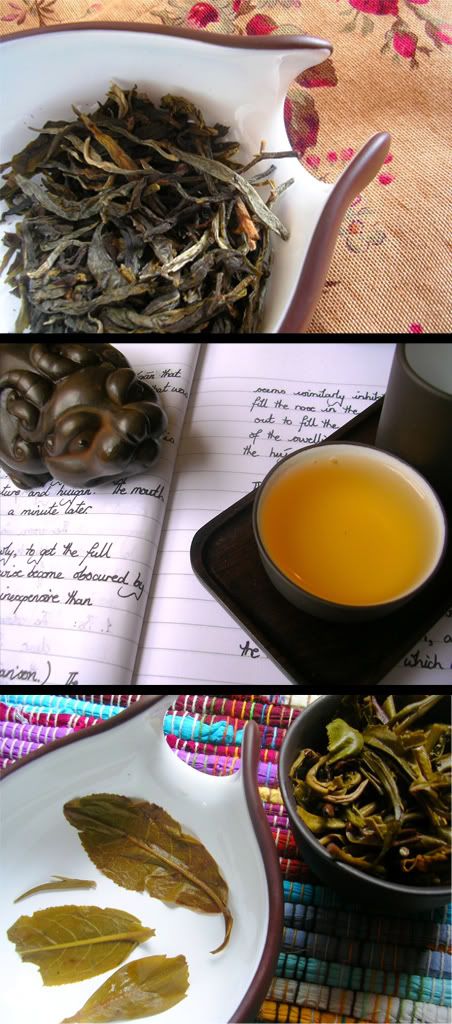
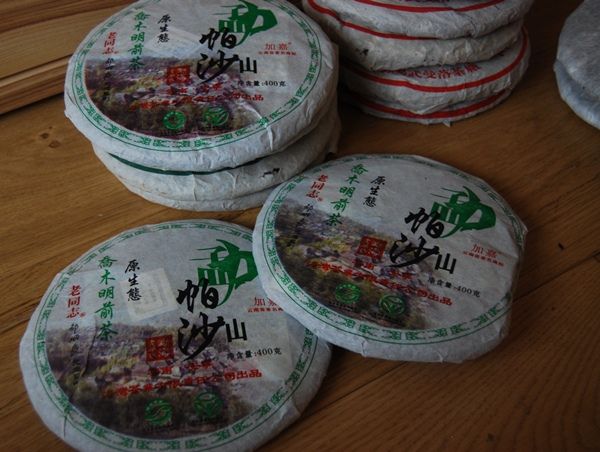
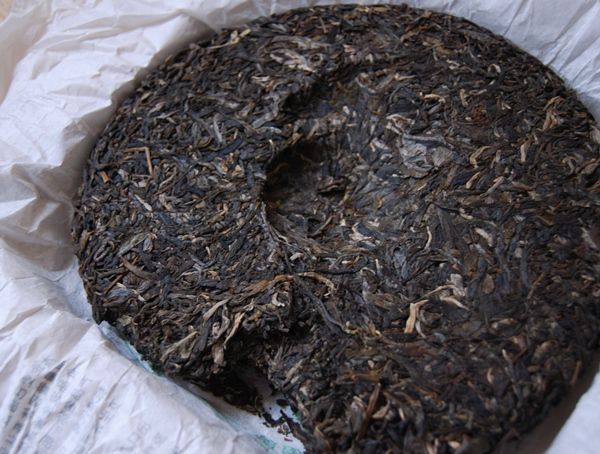
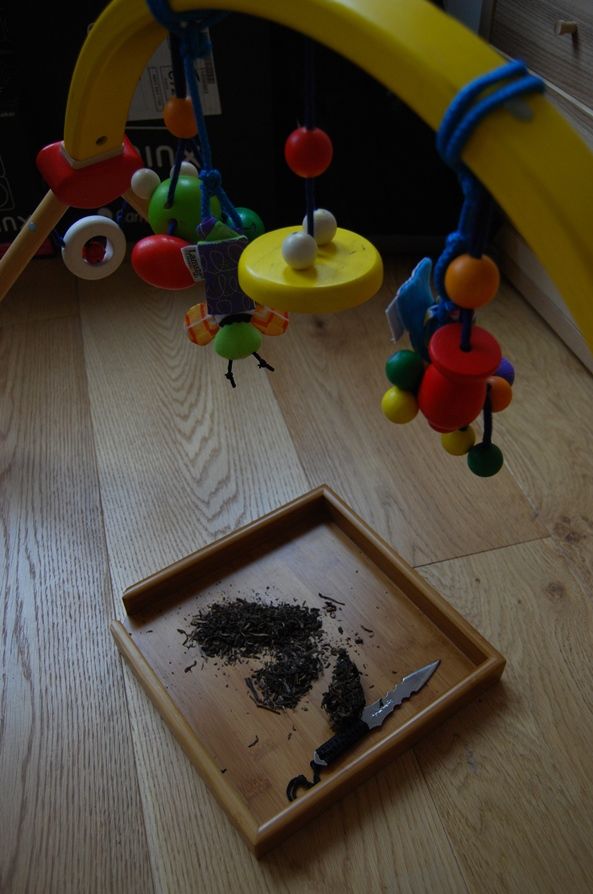
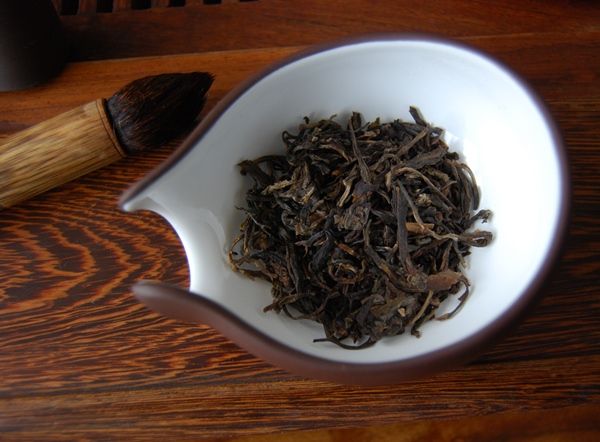
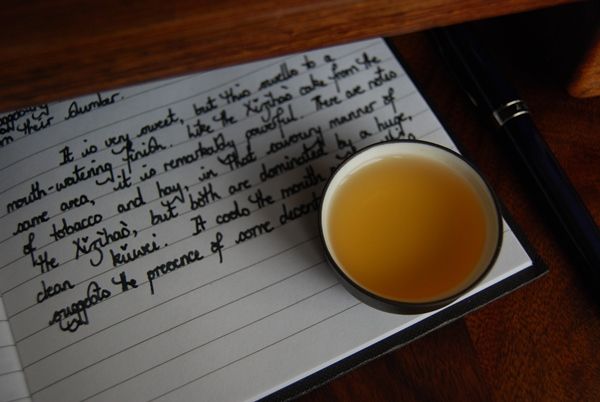
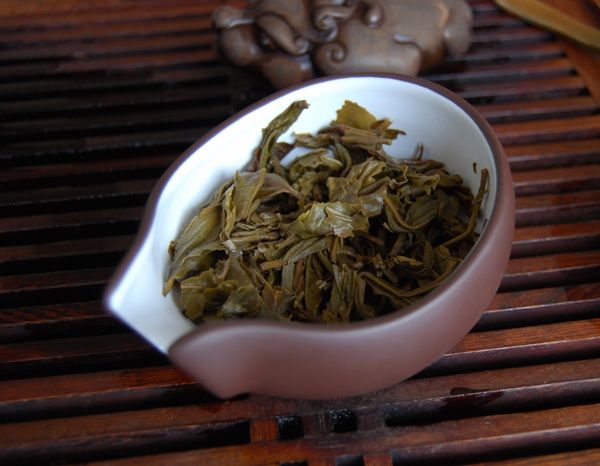
16 comments:
Nice post .. was that Single Malt Scottish Mountain water?
I’ll see if I can this tea and try it :).. regards john
I've tried this tea on Maliandao. While it's not bad.... I didn't think it was worth the price tag. There are, I think, similar teas that cost less.
But, of course, I'm speaking as somebody who had the time and the opportunity to try and buy those things. As things stand... it's probably not a bad bet.
John,
Not even a sign of tartan on the bottle!
MarshalN,
I would hope it's almost universally true that one can get better for less on Maliandao vs. Internet prices! I'd be surprised if it weren't so. As you say, though, this one's decent relative to the rest of the Internet.
Lei and I tried it twice since, thinking "was it our imagination?" but, thankfully not, this does seem to hold up to repeated sessions.
Toodlepip,
Hobbes
Hello Hobbes! Of course another eloquiently written post! I see that tuochatea.com sells a 200g 06' this very same shengpu beeng. It might be something of interest for those who in taste this beeng without committing to buy and entire beeng.
Dear Bill,
Good eye! I eventually found it in Tuochatea.com's "Specials" section. The price is around half that of Yunnan Sourcing, for about half the quantity - so about the same; definitely a good place to try it out. Copious certification, too. :)
It's amusing to see how much information the vendors get from the neipiao - both Yunnan Sourcing and Tuochatea have very similar claims for the cake, derived directly from the ticket!
Toodlepip,
Hobbes
Just now tasting the sample I broke from one of two beengs purchased impulsively back in that Gregorian era you refer to. My tasting notes, for once, correspond with yours almost exactly, the only exception being that mine brewed up murky, not clear, on the first few infusions, but still that rich, bright yellow.
Interesting on the murkiness - I wonder if that was related to the water. I'm glad to hear that we have a consensus of opinion!
Toodlepip,
Hobbes
Actually, I agree here as well. Especially with how this tea needs good water.
Anyway, after few years of aging, I think this tea has grown into a thing of great beauty and superb taste. What do you think about it now, after those 4 years of aging?
There may be better teas from Pa Sha...but in that age and price, I haven't found any. It's truly a special tea, I think.
Dear Jakub,
By sheer coincidence, you and I are reading the same old article on the Half-Dipper! I am revisiting this tea today, after having tried a modern Xizihao equivalent. I'll let you know how I get on. :)
I'm very glad to read of your positive news on the aging of this old friend.
All the best,
Toodlepip,
Hello Hobbes,
I'm looking forward to your opinion.
By the way, I found an interesting emergent taste in the cake - when it was young, and brewed with +- 80°C water, it was not really that good as when brewed with boiling water. However, after some time of aging, I found (accidentally, of course :-)) that when brewed with colder than boiling water, unbeliavable tones of blackberries and blueberries appear - I was astonished...
Hope you liked it/like it/will like it :-)
Jakub
Dear Jakub,
I've updated the article - it's a good tea still, but I think I have enough of it. The current asking price of $40 is fair, I think.
Toodlepip,
Hobbes
Thanks for the update.
I too have owned some of this (in smaller, 250g cakes) since perhaps 2008.
My impression is that it's not moving so much (with dry storage). In its youth, I found a pronounced citrusy character and the enlivening ku that you allude to. But I don't get as much sweetness as you seem to be getting.
I find this a pretty decent tea, for the price, in context: it tastes less of factory stuff than most shengs these days. And I'm confident it's still much on the ascending curve.
Dear Wojciech,
I forgot those little versions! Perhaps some of the sweetness comes from my tetsubin - it emphasises the brighter, sweeter notes of pu'ercha, in a way that I rather enjoy. (That may not be to your taste, of course.) It also adds a certain light, mineral "creaminess" to the water, which seems to perk up my pu'ercha somewhat.
I agree - this Haiwan is a lot less "factory" than a lot of modern cakes. It's a solid little chap.
Toodlepip,
Hobbes
At last, I brought myself to write a bit about it too. My notes are at: http://jakubtomek.blogspot.com/2011/05/2006-haiwan-pa-sha.html
(Hope it's not wrong to link to my blog like that; for years, blogs seemed to me like a tool of teenage emo girls used to torture sane people...I don't know the blog etiquette yet.)
Thanks for the link - I've added you to my "Diurnal Digest".
Toodlepip,
Hobbes
Thanks a lot!
Jakub
Post a Comment